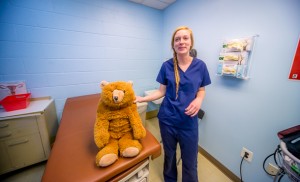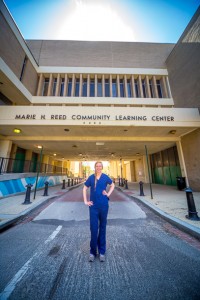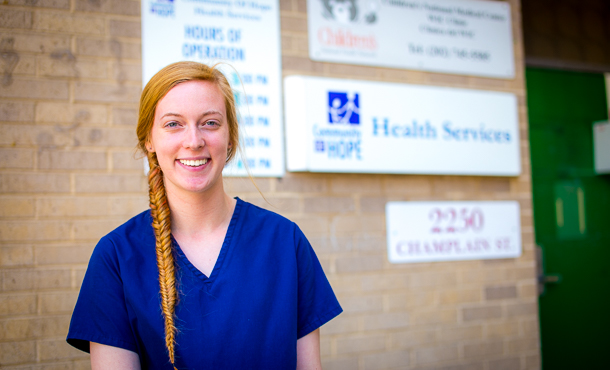Nancy Wharton, who comes from the small town of Strasburg, Virginia, “definitely” wanted to spend her cross-cultural semester in a different country. But the nursing student at Eastern Mennonite University spent some time looking at the “big workload” she was getting herself into, and also wondered if going abroad for a semester late in her college career was a good move.
The result: Wharton took advantage of finishing prerequisites early by spending the spring semester of her sophomore year at the Washington Community Scholar’s Center (WCSC), where she interned at the Community of Hope’s Marie Reed Health Center in Washington D.C.
The experience “gave me a solid foundation for the next two years of nursing studies,” Wharton said. “And most of the time job rejections come in the form of lack of experience, so having an internship directly in my future career would hopefully help my resume.”
Add to that the fun of living in and exploring around Washington D.C. with friends and a true cross-cultural experience, and Wharton says she gained far more than just vocational preparation. She has a new found confidence in her ability to navigate urban streets, and lots of great memories of new territory explored with friends.
Plan ahead for better internship experience

Building a foundation of “cultural competency” and learning special communication skills was an important emphasis.
Wharton’s choice is one that WCSC director Kimberly Schmidt hopes other pre-professional students will think about in the future. For many students in pre-professional programs with demanding course schedules, finding time for the required cross-cultural experience is difficult. Summer travel is one option, but with foresight and planning, students can fulfill cross-cultural requirements and gain valuable on-the-job training during the fall and spring semesters, said Schmidt.
“Over these terms, more opportunities are available in Washington DC, and supervisors have more energy and time for individualized instruction,” says Schmidt.
With fewer interns competing for attention, supervisors like registered nurse Roxana Trejo, at Marie Reed, can take the time to teach, guide and mentor.
“Marie Reed is a wonderful learning environment, perfect for students who have little clinical experience and have not entered into nursing clinical rotations yet,” says Schmidt. “And because of our history and networking in the city, we have many other placement options that can meet other the needs of other pre-professional majors as well.”
Intercultural nursing

Community of Hope has hosted EMU students since the internship program began in 1976 as the Washington Study Service Year (WSSY). The organization helps low-income families, including the homeless and refugees, with housing, health issues, and employment. Originally a ministry of the Church of the Nazarene, the organization has been independently run as a non-profit since 1980 and is widely recognized and respected for its work.
Marie Reed, in the Adams-Morgan neighborhood, is one of three health centers operated by Community of Hope. There, Wharton worked with grandmothers and their four-day-old grandchildren in the same day and with refugees “from Russia to Ethiopia to South Africa and everywhere in between,” she said. She helped homeless people and young struggling professionals looking for inexpensive healthcare.
“I didn’t think traveling just a short distance from EMU would expose me to so much diversity,” she said.
In her daily responsibilities, Wharton worked with the medical assistants to conduct pre-visit record reviews. She greeted and “roomed” patients, many of whom had limited English proficiency, took their vital signs and medical history, sometimes with the help of translators, and then entered information into the medical database.
“Sometime we go to the lab and run tests, give shots, or assist the providers (doctors),” she said. “It’s a lot to get done within a limited amount of time but it’s taught me so much about the operating system of the health care field and even more about effective ways to communicate with patients.”
Building a foundation of “cultural competency” and learning special communication skills was an important emphasis. “‘Up’ and ‘down’ may seem like simple words,” Wharton said in a chapel presentation back on the EMU campus in April, “but in the context of discussing a dose of medicine, a miscommunication could result in serious problems.”
Since working in the public health field, Wharton says she’s unsure which particular speciality she’s interested in, but the experience confirmed her desire to become a nurse. She does know, however, that her time at Marie Reed has helped lay a strong foundation of critical skills for her future.
“Since I started my internship before my clinicals, everything I’ve learned about actually practicing nursing I owe to Marie Reed,” she said. “The staff here is beyond wonderful to work with and they all cared so much about helping me learn what I needed to be successful.”
Living and working in the city
In the end, Wharton’s WCSC experience was a positive one, and that is partly due to her own motivation, says Kelsey Kauffman, assistant director, who observed Wharton’s “blooming” during the semester. (Kauffman, Schmidt and communications director Erica Grasse are integral to the Nelson Good House community life: “This program wouldn’t have been as special to me had it not been for them,” Wharton wrote in a later email.)
“Any cross-cultural is what a student makes of it,” said Kauffman, who has conducted graduate research into cross-cultural studies in faith-based environments. “Between handling a variety of challenging situations in her internship adeptly and with great compassion, and stretching herself personally, Nancy has pushed the boundaries of her comfort zone intentionally and repeatedly.”
From visiting approximately 100 ethnic restaurants (yes, the housemates kept track) to exploring museums and enjoying concerts and sporting events, Wharton and her fellow cross-cultural students definitely made most of their experience together. That made all difference for Wharton, who was initially hesitant about living and working in the urban environment.
“It was great living in such a supportive environment,” she said. “I’m very thankful for my housemates and they’ve made this semester a great one for me.”
